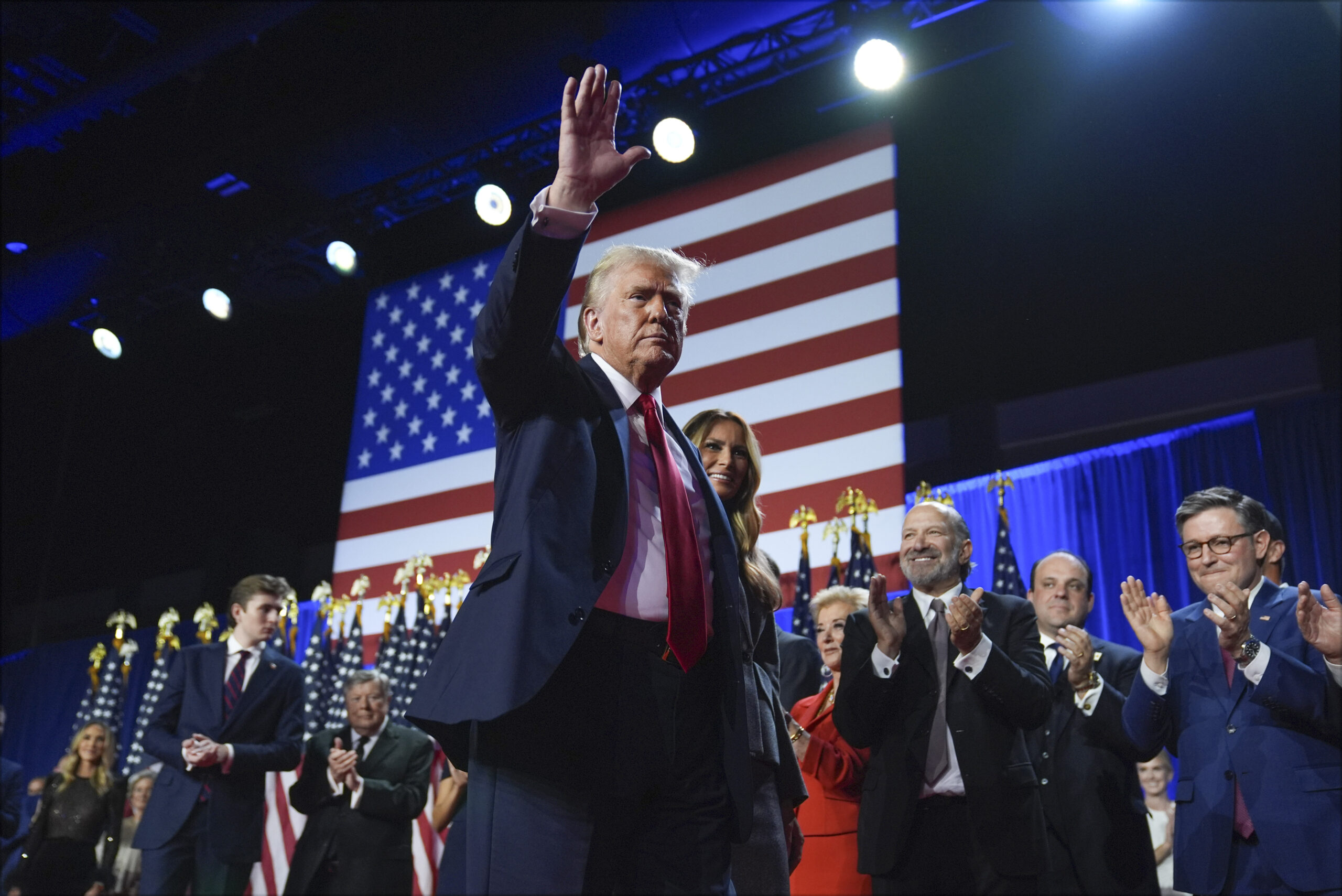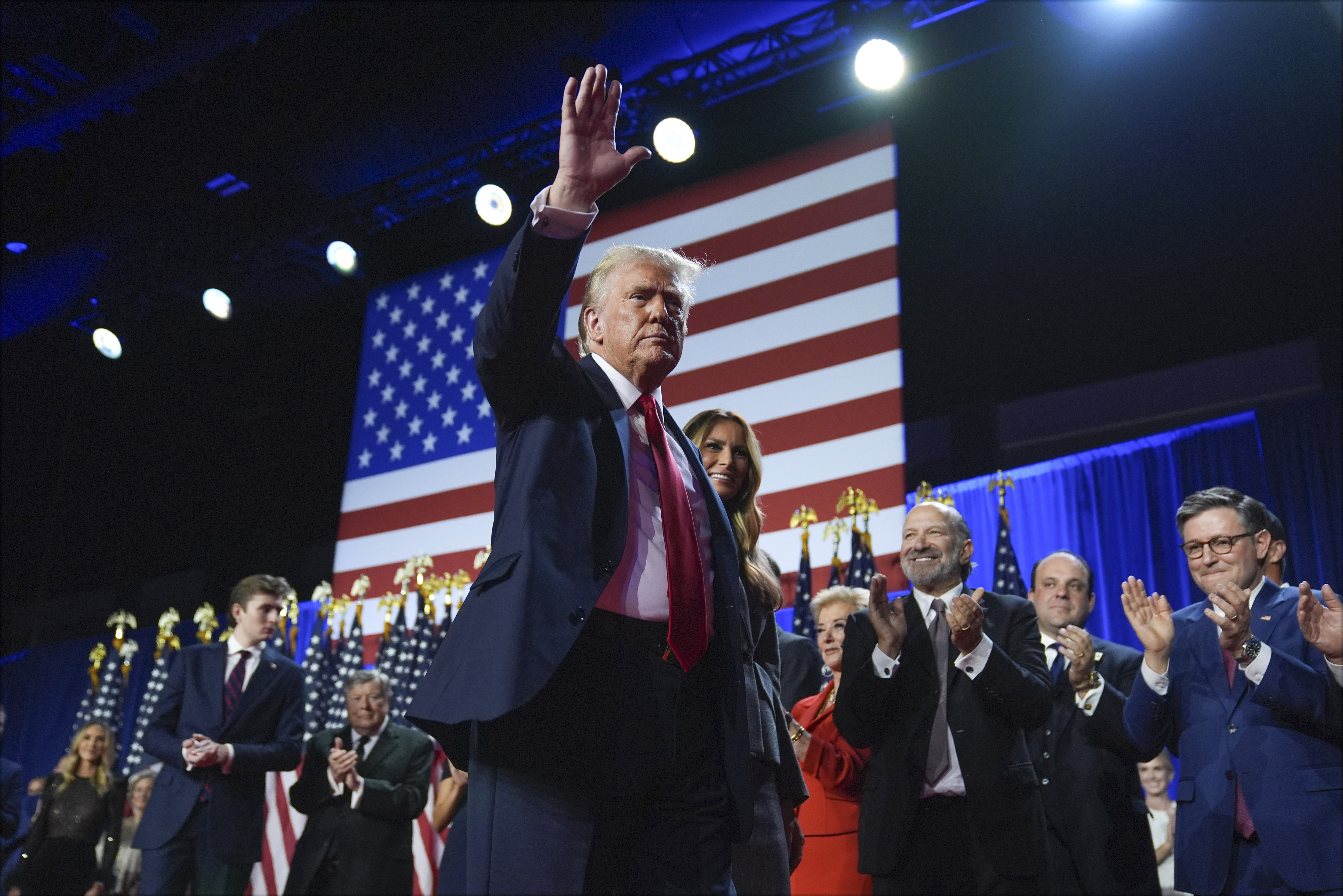Politics
How blue states are plotting to thwart Trump

Donald Trump pledged in one of his final campaign speeches to work with Democratic mayors and governors if reelected. But just hours after the former president was projected to win back the White House, some blue-state leaders were actively plotting against him.
California Gov. Gavin Newsom, one of Trump’s fiercest critics, on Thursday called a special legislative session to funnel more resources toward the state’s legal defenses to preemptively combat Republican policies around immigration, the environment, LGBTQ+ rights and reproductive care.
New York Gov. Kathy Hochul and Attorney General Letitia James — one of Trump’s most aggressive first-term adversaries — pledged to beef up coordination between their offices to “protect New Yorkers’ fundamental freedoms from any potential threats.”
And attorneys general across blue states are prepared to take Trump to court — just as their predecessors did hundreds of times during his first administration.
If Trump’s reelection represented a realignment in American politics, blue-state leaders are choosing to confront it with a return to form, resuming the counterweight roles they played during his first administration as their party reckons with a nationwide repudiation.
“We’ve been talking for months with attorneys general throughout the nation, preparing, planning, strategizing for the possibility of this day,” California Attorney General Rob Bonta said at a press conference in San Francisco on Thursday.
Trump’s two-year campaign to retake the White House — and polls that for months showed he could succeed — gave Democrats the lead time they lacked in 2016 to shore up their defenses against conservative policies. And they are using as a guide his campaign-trail calls for mass deportations and regulatory rollbacks, as well as Project 2025, the conservative blueprint for a Republican administration that Trump has distanced himself from but that dozens of his former administration officials had a hand in crafting.

Governors and lawmakers in several blue states have already passed laws bolstering reproductive rights since the fall of Roe and stockpiled the abortion pill mifepristone in response to further legal threats to reproductive care. While Trump has vowed to veto a national abortion ban, that’s hardly alleviated Democrats’ fears. And as he barreled toward a second term, they raced to address other areas of concern, pushing ballot measures to protect same-sex marriage, labor rights and other liberal causes.
Even as he briefly pledged in the closing days of his campaign to work across the aisle, Trump has also vowed to punish his political opponents — and many blue-state leaders are at the top of his list of adversaries. On Friday, the president-elect tore into Newsom for calling a special legislative session.
“Governor Gavin Newscum is trying to KILL our Nation’s beautiful California,” Trump said Friday in a post on Truth Social, using his derisive nickname for the governor. “He is using the term ‘Trump-Proof’ as a way of stopping all of the GREAT things that can be done to ‘Make California Great Again.’”
And so Democratic governors and attorneys general who have spent months strategizing on how to protect their states’ progressive policies from a possible second Trump term are kicking those efforts into higher gear.
Some governors are discussing how to ensure that federal funding for state projects makes it to their coffers before Trump takes power, potentially with total Republican control of Congress, said one person who works in a Democratic governor’s office, granted anonymity to disclose private conversations. The discussions convey the concerns among some Democrats that Republicans could pause disbursements from, or even repeal, President Joe Biden’s signature programs, such as the CHIPS and Inflation Reduction acts.
Illinois Gov. JB Pritzker also said Thursday that he has spoken with other Democratic governors since the election about how to best Trump-proof their states.
“There are many people whose lives and livelihoods are at risk, and there are many people who cried at the [election] result because they know what impact it may have on their families,” Pritzker said at a press conference Thursday.
He also delivered a warning: “You come for my people, you come through me.”
In California, where Democratic leaders became some of the de facto heads of the Trump resistance after his 2016 election, officials spent months working to shore up the state’s climate policies and disaster preparedness in anticipation of an antagonistic federal government even before Newsom called the special legislative session.
“The freedoms we hold dear in California are under attack,” Newsom declared in a statement. “And we won’t sit idle.”
In New York, Hochul and James created the Empire State Freedom Initiative, a program that is meant to address “policy and regulatory threats” from the incoming Trump administration, including against reproductive and LGBTQ+ rights, as well as gun safety and environmental justice. The New York governor also signaled she will propose legislation as well as take executive action in response to Trump’s victory, but did not provide specifics.
“New York will remain a bastion for freedom and rule of law,” Hochul said. “I’ll do everything in my power to ensure that New York remains a bastion from efforts where those rights are being denied in other states.”
James could have an outsize impact on how Trump’s policies trickle down to New York. The Democrat, who was first elected in 2018, sued Trump’s real estate business for fraud. She won a $450 million judgment, which is being appealed.

Meanwhile, state prosecutors who often served as the first line of defense against Trump’s most controversial executive orders in his last term — banding together to try to block his travel restrictions from some Muslim-majority countries, challenge his plans to roll back vehicle emissions standards, and more — have long been preparing to again serve as a legal bulwark.
In California, state lawyers have meticulously prepared for Trump’s return — down to crafting draft briefings, weighing specific legal arguments and debating favorable litigation venues, Bonta, the attorney general, told Blue Light News.
“If he comes into office and he follows the law and he doesn’t violate the constitution and he doesn’t violate other important laws, like the Administrative Procedure Act he violated all the time last time, then there’s nothing for us to do,” Bonta said. “But if he violates the law, as he has said he would, as Project 2025 says he will, then we are ready. … We have gone down to the detail of: What court do we file in?”
In New Jersey, state Attorney General Matt Platkin cited mass deportations, an “aggressive reading of the Comstock Act” to potentially impose an abortion ban and “gutting clean water protection” as potential sources of litigation.
“If you look at the things that have been said by the president and his associates during the campaign, … if you read Project 2025, there are proposals that are clearly unlawful and that would undermine the rights of our residents,” Platkin said in an interview.
And in Massachusetts, first-term Attorney General Andrea Campbell’s office has been preparing to act against threats to reproductive, LGBTQ+ and immigrants’ rights and student loan-forgiveness programs, among other areas.
In response to a request for comment, Trump’s team said in a statement: “The American people re-elected President Trump by a resounding margin giving him a mandate to implement the promises he made on the campaign trail. He will deliver.”
Democrats’ rush to reform their resistance to Trump is partly self-serving. Governors and state prosecutors who took on Trump during his first term burnished their national profiles in the process.
In some cases they were able to parlay their opposition into higher office: Massachusetts’ Maura Healey leveraged her lawsuits against Trump as attorney general to help win the governorship in 2022; California’s Xavier Becerra, the former state attorney general, is now the Biden administration’s Health and Human Services secretary and is eyeing a run for governor. And for Democrats who’ve been chafing for a chance to get off the party’s deep bench, a second Trump term presents a fresh opportunity for a potentially star-making turn ahead of an open 2028 presidential primary.
That jockeying has in some ways already begun. Several blue-state leaders held press conferences on Wednesday and Thursday to reassure anxious constituents that doubled as ways to establish themselves as leaders in the anti-Trump fight. On Wednesday, Healey was on MSNBC vowing that state police would not be involved in carrying out the mass deportations Trump has promised, seizing a national platform in a way she rarely has since challenging Trump in the courtroom as attorney general.
But there was some acknowledgment among top city and state Democrats that they would have to find ways to work with Trump, too — mainly on infrastructure projects which are often reliant on massive amounts of federal funding.
“If it’s contrary to our values, we will fight to the death,” New Jersey Gov. Phil Murphy said during a Wednesday press conference about the election results. “If there’s an opportunity for common ground, we will seize that as fast as anybody.”
New York City Mayor Eric Adams similarly pledged to find ways to partner with the incoming administration, naming infrastructure as a target area for future collaboration.
“I communicated with the president yesterday to state that there are many issues here in the city that we want to work together with the administration to address,” Adams said during a news conference Thursday. “The city must move forward.”
Holly Otterbein, Melanie Mason, Nick Reisman, Daniel Han, Maya Kaufman, Shia Kapos and Kelly Garrity contributed to this report.
Politics
More than a dozen staffers leave Heritage to join Pence-led nonprofit
More than a dozen staffers at The Heritage Foundation are leaving the conservative think tank to join a nonprofit led by former Vice President Mike Pence as the embattled organization continues to reel from ongoing turmoil.
Advancing American Freedom — founded by Pence in 2021 “to defend liberty and advance policies that build a stronger America” — announced Monday that three senior officials who led the legal, economic and data teams at Heritage would be joining the group next year, along with several members of their teams.
The departures, first reported by The Wall Street Journal, mark the latest sign of upheaval at Heritage, which has seen dozens of staffers flee the organization since it became engulfed in a scandal involving Holocaust denier Nick Fuentes and the ongoing debate within the conservative movement over antisemitism.
Heritage Foundation President Kevin Roberts, the architect behind the “Project 2025” blueprint for President Donald Trump’s second administration, drew sharp rebukes from conservative voices, including commentator Ben Shapiro, after standing by conservative commentator Tucker Carlson’s friendly interview with Fuentes in October.
In the wake of the initial backlash, Roberts told staffers he’d make a “mistake,” but asked for the chance to “clean it up” during a November all-staff meeting, according to a leaked video first published by the Washington Free Beacon.
The hires by Advancing American Freedom signal that the organization is looking to position itself as a key player within the broader conservative movement.
“AAF is honored to welcome these principled conservative scholars to the team,” Pence, who has been the target of Trump’s ire since the former vice president certified the 2020 election results, said in a statement. “They bring a wealth of experience, a love of country, and a deep commitment to the Constitution and Conservative Movement that will further the cause of liberty.”
Andrew Olivastro, chief advancement officer at The Heritage Foundation, said in a Monday statement that the think tank’s “mission is unchanged, and our leadership is strong and decisive.”
“Heritage has always welcomed debate, but alignment on mission and loyalty to the institution are non-negotiable. A handful of staff chose a different path — some through disruption, others through disloyalty,” Olivastro said.
In his statement, Olivastro said several of the departing staffers were “terminated for conduct inconsistent with Heritage’s mission and standards” last week, adding that “Their departures clear the way for a stronger, more focused team.”
Former Heritage Vice President John Malcolm is slated to lead AAF’s new Edwin Meese III Institute for the Rule of Law, which is being relocated from Heritage. Jessica Reinsch, formerly deputy director of programs at the Meese Center, will serve as director of programs, and five other former employees at Heritage will also join AAF’s Meese Institute.
Five staffers from Heritage’s economic policy institute and its federal budget center will join AAF’s Plymouth Institute for Free Enterprise, and former Heritage’s Chief Statistician Kevin Dayaratna will lead its Center for Statistical Modeling & Scientific Analysis.
Josh Blackman, a legal scholar who contributed to Project 2025, also resigned his post as senior editor of the Heritage Guide to the Constitution on Sunday. In his resignation letter, Blackman wrote that Roberts’ remarks “were a huge unforced blunder, and gave aid and comfort to the rising tide of antisemitism on the right,” in addition to undermining the work of the Meese Center.
“Your initial remarks were indefensible. Your apology was underwhelming. And the lack of any meaningful followup over the past three months has been telling,” Blackman wrote in his letter to Roberts.
Still, some Heritage staffers have remained loyal to the organization, with conservative activist Robby Starbuck sharing Monday that he would be extending his stay as a visiting fellow at the think tank. Starbuck wrote on social media that “these resignations have a lot more to do with 2028 than it does with anything else,” accusing Blackman and others who stepped down of yearning for “a return to the Pence/Ryan GOP.”
The shock waves from the infighting at Heritage, once a key player in the MAGA coalition, have continued to reverberate throughout the GOP, with Republican firebrands like Carlson, Shapiro, Vivek Ramaswamy and Steve Bannon sparring over Fuentes and whether he had a place in the party this weekend at Turning Point’s AmericaFest in Phoenix.
Politics
Trump critic George Conway files to run for NY House seat
George Conway, a conservative lawyer and vocal critic of President Donald Trump, filed paperwork on Monday to run as a Democrat for the seat Rep. Jerry Nadler (D-N.Y.) is vacating.
News of Conway entering the race began surfacing last month, especially after Conway confirmed he had hired a Democratic pollster to weigh his chances.
Conway was previously married to Kellyanne Conway, who helped manage Trump’s 2016 presidential bid and then served in the White House during Trump’s first term.
Though George Conway was also offered a position with the administration during Trump’s first term, he declined. The relationship between the president and Conway turned contentious, with Conway often criticizing Trump and the president in turn commenting on the Conways’ marriage.
The feud ultimately culminated in Trump calling Conway a “stone cold LOSER & husband from hell” and Conway calling Trump a “fascist.” Conway went on to pen an essay that called Trump “unfit for office.”
The lawyer eventually co-founded The Lincoln Project, a PAC of former Republicans with a self-described purpose of defeating Trump, and has continued to criticize the president.
Conway will join an increasingly crowded primary race for Nadler’s seat. At least 10 hopefuls — including Jack Schlossberg, the only grandson of John F. Kennedy — have filed to run for the position since Nadler announced in September he would not seek reelection.
March for Our Lives organizer Cameron Kasky, Assemblymen Alex Bores and Micah Lasher and Councilmember Erik Bottcher have also filed to run for the Manhattan-based seat.
Politics
CBS pulls ‘60 Minutes’ segment on notorious El Salvador prison
CBS News abruptly pulled a “60 Minutes” investigation featuring Venezuelan men deported to El Salvador’s CECOT prison on Sunday, sparking swift backlash within the newsroom, including from the story’s veteran correspondent.
The canceled segment, yanked at the behest of newly appointed editor in chief Bari Weiss, focused on the notorious El Salvador prison that President Donald Trump has deported immigrants to despite reports of human rights violations within the prison. Several men now released from the prison were featured in the segment describing the conditions they endured within CECOT.
But Weiss nixed the segment just hours before it was set to air after calling for multiple additions, according to The New York Times, including an interview with top Trump adviser Stephen Miller or another top official in the Trump administration.
CBS said in a statement that the segment will air at a later date, and Weiss defended the decision to hold the segment in a statement to The New York Times.
“My job is to make sure that all stories we publish are the best they can be,” Weiss said. “Holding stories that aren’t ready for whatever reason — that they lack sufficient context, say, or that they are missing critical voices — happens every day in every newsroom. I look forward to airing this important piece when it’s ready.”
But Sharyn Alfonsi, the veteran correspondent on the story, condemned Weiss’ decision.
In an email obtained by The New York Times and later shared on social media by Times reporter Michael M. Grynbaum, Alfonsi told her CBS colleagues that reporters on the segment had requested comment from the White House, the Department of Homeland Security and the State Department. She added that the segment had also already undergone a rigorous review and fact-checking process.
To pull the story so close to airtime, Alfonsi said, is “not an editorial decision, it is a political one.”
“Government silence is a statement, not a VETO,” Alfonsi wrote. “Their refusal to be interviewed is a tactical maneuver designed to kill the story.”
She continued, “If the administration’s refusal to participate becomes a valid reason to spike a story, we have effectively handed them a ‘kill switch’ for any reporting they find convenient.”
Alfonsi added that if CBS’ new standard for airing a segment requires government interviews, then the government “effectively gains control over the ’60 Minutes’ broadcast.”
“We have been promoting this story on social media for days. Our viewers are expecting it,” Alfonsi wrote. “When it airs without a credible explanation, the public will correctly identify this as corporate censorship. We are trading 50 years of ‘Gold Standard’ reputation for a single week of political quiet.”
CBS did not immediately respond to a request for comment.
The cancellation of “Inside CECOT” is the latest in a string of controversial moves made by the media giant this year.
In July, CBS announced a $16 million settlement with Trump, who sued the company as a private citizen following his own appearance on “60 Minutes.” It was after that settlement that the Trump administration approved Paramount Skydance’s acquisition of CBS.
Weiss, founder of The Free Press, was appointed as editor in chief by Paramount owner David Ellison in October to overhaul the newsroom.
Trump has continued to express his displeasure with CBS, but that hasn’t stopped Ellison from courting the administration’s favor as he seeks to acquire Warner Bros. Discovery.
-

 Politics10 months ago
Politics10 months agoBlue Light News’s Editorial Director Ryan Hutchins speaks at Blue Light News’s 2025 Governors Summit
-

 Politics10 months ago
Politics10 months agoFormer ‘Squad’ members launching ‘Bowman and Bush’ YouTube show
-

 The Dictatorship10 months ago
The Dictatorship10 months agoLuigi Mangione acknowledges public support in first official statement since arrest
-

 The Dictatorship10 months ago
The Dictatorship10 months agoPete Hegseth’s tenure at the Pentagon goes from bad to worse
-
Uncategorized1 year ago
Bob Good to step down as Freedom Caucus chair this week
-

 Politics10 months ago
Politics10 months agoFormer Kentucky AG Daniel Cameron launches Senate bid
-

 The Dictatorship3 months ago
The Dictatorship3 months agoMike Johnson sums up the GOP’s arrogant position on military occupation with two words
-

 Politics8 months ago
Politics8 months agoDemocrat challenging Joni Ernst: I want to ‘tear down’ party, ‘build it back up’



